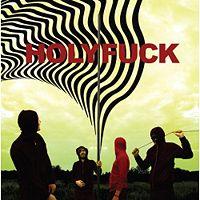If you have read up on Holy Fuck, you may have came across a description of their 2007 album, simply titled LP, as being a mesh of both Krautrock and punk. Honestly, I can sometimes see the German influence, but fail to see the components of the genre that we all love be utilized in this album, other than they play their instruments nicely loud. Yet, that facet does not just make a band punk, does it?
Now, it should be said that I am writing this review of a Krautrock-influenced electronic dance band not because I don't have a life (well, that's also the case, but anyway). Instead, this review is being written, even despite LP being mightily flawed, because I believe sooner or later we will have a whole genre of Krautrock-influenced, electronic-punk bands. You see, right now we have the band Fucked Up, which as you probably know, mixes hardcore punk with this German rock. While in post-punk / new wave revival, it is popular to be used on the dance floor: much like Bloc Party, LCD Soundsystem and their many peers. Therefore, it is just a matter of time that the sound of punk expands its influence with other sounds as a reference. Will bands like Holy Fuck be one of those forerunners? Well, maybe, maybe not.
You see, the mostly instrumental LP is nothing original, especially to those who have had a listen to Fuck Buttons, a band that tuned the ears of all indie-electronic fans in 2008 with their album Street Horrrsing. Yet Holy Fuck, a band without clear vocals (like Fuck Buttons), are always choppy and drenched in feedback; but unlike Fuck Buttons, on the whole their sound takes a lot from the past, but gives little.
Right off the bat, LP shows this non-forwardness with the song "Super Inuit." It is here when you realize that they already use the same opening as the Krautrock-influenced post-rock band Cul de Sac, and their song, "Death Kit Train," found on that band's album, Ecim. It will be said that the song does nothing to outdo the original, nor does it even make it much different. However, there's one exception: a live sound. While this is not enough to save it necessarily, it is enough to make it, well, somewhat fashionable again. It also, hopefully, is not done so bad as to make Cul de Sac's biggest influence, Michael Karoli, the deceased guitarist of the 1970 German band, Can, from spinning in his grave.
After that song, Holy Fuck gets into dance mode for most of the rest of the album. The next song here, "Milkshake," once again, does not do much to rise out of formulaic tyranny, other than the live-sounding reverb and the accessible feel. Just this time, instead of lifting from Krautrock, it rather takes from club music. What club artists / DJs does it take from? Well, I can't tell you exactly, but it sounds familiar to anyone that has been on a dance floor. There's nothing on this track or the next song, "Frenchy's," to really mark it transcending. Again, it may feel safe and is even above average, but safeness does not good art make, does it? Rather, cut-and-pasting from the past makes it, at best, fun. Yet, honestly, Holy Fuck is fun, solely because dance music is often just that.
The album reaches its zenith with the fourth song here, "Lovely Allen." This is a song that starts with a rising, anthemia-instrument chime, that may go on about 1:15 minutes too long, yet has a nice epic feel. The song is not that dance-driven; rather, "Lovely Allen" would be good background music for a movie, especially in a climatic scene. This happy rocker, again, feels too familiar, but it is nice to have it included -- especially because after this point, LP goes into overblown bombast.
The wavy "The Pulse" may live up to its title, in that, if you put your ear to its heart, you will see after a good minute, in this nearly six-minute song, that you'd just rather check your watch. The conclusion here, also, just frankly takes way too long. While "Echo Sam" is slightly better, other than some good timed-screaming near the end it falls into the same category. Both "Royal Gregory" and "Safari" are more of the same.
The album is ended with its ninth song, "Choppers," and while it too could be worse, they also lift that same sound of Cul de Sac's "Death Kit Train" in the background. Now, this time, it does indeed sound much different; yet, by now you just don't really care, other than to let your mind relax a bit with the safeness of it all.
